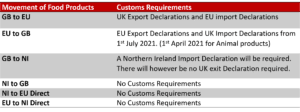Where’s the orange juice gone?…
by David Knox
Moving Food between the UK and the EU now the UK has left the EU
With the end of the transition period now upon us, we are beginning to realise first hand what the new trading arrangements between Northern Ireland, Great Britain and the EU look like in practice.
One sector in which changes have been witnessed with almost immediate effect is in the supply of food and drink products.
Supermarket shelves have becoming quietly emptier, and major some major retailers have announced significant operational changes, such as the move by Sainsbury’s last week to begin stocking Spar products. Marks and Spencer’s have also announced that they are cutting hundreds of food product lines as they are unconvinced that supplies will not be subject to delays as new paperwork verification processes are implemented.
Uncertainty also seems to be remain as to when additional taxes and tariffs will be applied to ‘At Risk’ goods, with the origin of goods becoming an increasingly important factor in determining supply chain and logistics costs.
This new blog by the Trade Team at Pinnacle Growth Group looks at what is causing the hold up within the food and drink industry, and considers approaches that could be taken to mitigate any disruption or additional costs.
For further information on the new requirements on food products, or products of plant or animal origin, get in contact with Pinnacle Growth Group at info@pinnaclegrowth.group, or contact David Knox on 07591828953.
What are the new Requirements?
It is now clear that businesses trading food products between the UK and the EU (which, from a trade perspective, includes Northern Ireland) will have several new requirements which they must consider prior to transporting food products. These include:
- Import and Export Customs Declarations
- Export Health Certificates/ Phytosanitary Certificates on all products of Animal Origin
- Changes to Labelling Requirements
These changes represent a significant increase not just in the level of paperwork required in the movement of food products, but also requires suppliers to consider that the correct packaging is being used.
The implementation of these changes will be felt in the form of additional costs in obtaining the correct certificates, and also in terms of the time spent on ensuring compliance. As has also been witnessed already, deliver times are being impacted by the need to scrutinise paperwork on products of this nature that are entering the EU Single Market from Great Britain.
Customs Requirements
Food suppliers can minimise the possibility of disruption by ensuring that the correct paperwork accompanies any products being moved between Great Britain and Northern Ireland/the European Union.
However, the timely delivery of goods is still very much dependent on the capacity of the physical customs infrastructure at points of entry.
The customs requirements can vary depending on the trade route being undertaken by the goods:


As illustrated, there will be a substantial number of customs declarations required when moving food products between the EU and GB and between GB and Northern Ireland.
It is therefore important for businesses involved in the importation and exportation of food products to:
- Consider how they plan to meet the new requirements for customs declarations going forward, by either completing them in-house or through a third party customs specialist.
- Ensure that commodity codes for all goods being imported are
- Agree IncoTerms with suppliers and distributors so that roles and responsibilities during the transport of goods is clear.
Health Requirements
In addition to customs declarations, businesses products of animal origin from GB to the EU will require an Export Health Certificate.
This is a document that sets out that products being transported meet all the health requirements of the country of destination.
This certificate will be required all shipments containing products of animal origin, and will also have to be verified by an official Veterinarian prior to approval.
More information including how to apply for an Export Health Certificate can be found at the following link: https://www.gov.uk/guidance/get-an-export-health-certificate.
Similarly, the import or export of plant products will also face additional requirements, and from 1st January 2021 all exports of Plant products from the UK to the EU will require a Phytosanitary Certificate, and will be required to enter via an approved Border Control Post.
Fortunately, the requirements for importing plant products into the UK from the EU will be phased in over the first half of 2021 with certificates required on some high-risk plants from the 1st January and all plants from the 1st July 2021.
Examples of products where this will apply include:
- Fruit and Vegetables
- Seeds
- Potatoes
- Grain
- Wood
There is therefore scope for this to impact the supply of goods across multiple sectors of the economy, as well as potentially causing shortages in popular garden and horticulture products as we approach Spring.
Labelling Requirements
There will also be substantial changes in labelling requirements for many food products now the transition has ended. For businesses in the food and drink industry it is imperative that they are aware of these requirements.
- Going Forward food produced in GB will no longer be able to display EU origin. Any food produced in GB will have to display either UK or UK(NI) origin on all food products.
- Food sold in GB this can be labelled as Origin EU until the 31st of September 2022. After this date all labelling must be updated accordingly.
Any questions?
Contact us


























